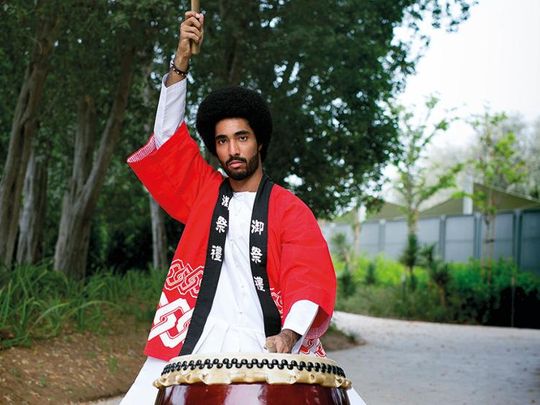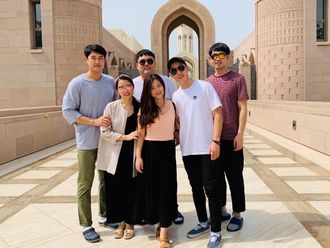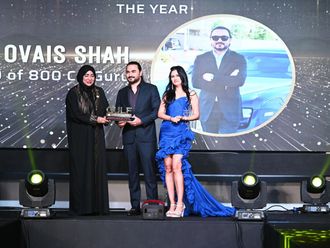
How did you get into wadaiko drumming and co-found Kharsha?
I’ve been interested in drumming since I was a kid but I was [inclined towards] western /jazz-style of drumming. My mother never allowed me to have drums at home since they’re really loud. Then I met Yotaro, the co-founder of Kharsha in March 2016 at a meetup for Japanese and Emirati students to exchange ideas and interests. A year later, Yotaro contacted me saying he’ll be studying at Zayed University as an international student and if I’d like to play the drums with him. Our first performance in the Japanese School’s sports festival in January 2017 was the catalyst to taking our drumming from a small university activity, to a proper group and we founded Kharsha Drums.
What do you enjoy the most about conducting workshops at Manarat Al Saadiyat?
What makes us love the Japanese drums is how despite our different backgrounds it helps us connects us through the universal language of music. [During workshops], I really enjoy watching kids and adults have fun drumming and the joy they express while learning how to drum is really what keeps me going on as a drummer. It makes me believe that whether you’re a child, an adult, a musician, or someone with no musical background, we can all be be connected through one hit of a drum.
Drumming requires a lot of energy. Every practice session must feel like a workout in itself, right?
Yes, the special and unique aspect of Japanese drumming is that you must use all the muscles in your body to hit the drum and produce a loud yet fine sound. It has nothing to do with the fact that you are a male or female, or muscular or [lean]. It all comes down to how much time and effort you put in, mastering the right technique. and getting used to that feeling of hitting the drum. Most Kharsha members don’t exercise or go to the gym, instead we use our practice sessions as our gym time as they can sometimes last five to six hours.
Is it true that most of Kharsha’s members have no musical experience or background? How do you manage to deliver such masterful performances?
Yes, in Kharsha it does not matter if you have musical background or talent. All we care about is being dedicated to drumming and having fun. Yotaro taught us the musical pieces through unconventional methods without musical sheets and scores. Each member has their own unique methods to memorise – some people re-read the piece and listen to it on their phone all day long, others write down the sounds we make on the drum as if they are lyrics.
How do you differentiate between cultural amalgamation and cultural appropriation of music and attire?
One of our strongest points as a band is the fusion [of cultures] in our name, attire, and music in a rather awkward yet an interesting way that always throws people off. Our name is Emirati, our attire is split into two halves – the upper half is from our traditional Emirati kandoura, and the lower half is from the traditional Japanese hakama, which makes both Japanese and Emirati people recognise our origin from the first glance. So far, our music has been pure Japanese, so it’s always been new and unique to the non-Japanese people in this region.
What role, according to you, does music play in a world that is increasingly becoming divisive? How has music made foreign cultures more relatable to you?
I feel that music is one of the important means to know more about the background and the culture of a country, because wherever you go music always has a story behind it, and that is how I understood many things about Japan. Wadaiko as an art is not only about hitting the drum there is much more to it – it is more about discipline, cooperation, harmony and unity. Realising that made me understand the reason why Japanese people conduct themselves in a very specific and strict manner.
What does Kharsha mean?
Watching Yotaro and his home team in Japan drum, I couldn’t help thinking how their performance is exciting or rather ‘epic’, and in our local dialect that sort of feeling or performance can be explained using many words but what popped up in my head was Kharsha. Yotaro liked the sound of it, and we decided to officially call ourselves Kharsha, the Emirati-Japanese drumming group.
What are the differences and similarities between Japanese Wadaiko drumming and Emirati drums?
Japanese and Emirati drumming are very different in how the music is composed. The concept of Wadaiko relies on connecting strong and simple rhythms together to produce a complicated piece. On the contrary, Emirati drumming focuses on musicality and how versatile the beat is. In addition, the difference in tones between the two drums is huge – the Japanese drum is low toned and the Emirati one is high toned, which makes it difficult to create Emirati rhythms using Japanese drums. Once we overcome that hurdle [our music] will show real unity between Emirati and Japanese cultures.












